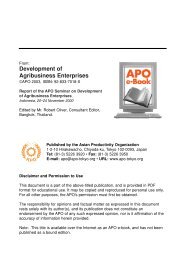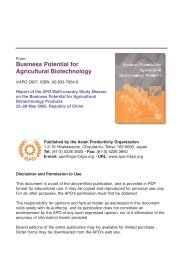Annual Report 2009 - Asian Productivity Organization
Annual Report 2009 - Asian Productivity Organization
Annual Report 2009 - Asian Productivity Organization
Create successful ePaper yourself
Turn your PDF publications into a flip-book with our unique Google optimized e-Paper software.
AGRICULTURE SECTOR<br />
48<br />
and processed food products in Germany and other<br />
major markets in the EU; identified opportunities for<br />
exports of agricultural and processed food products to<br />
those markets; explored networking with importers;<br />
and attended relevant sessions of the Anuga <strong>2009</strong><br />
Food and Beverage Fair in Cologne. The mission was<br />
attended by 18 participants from nine countries.<br />
Program coverage: Business opportunities in the German<br />
food and beverage market; Trends in production<br />
and trade (import-export) of agrifood products in<br />
Germany and the EU; Relevant rules and regulations<br />
on imports of food products in Germany and the EU;<br />
and Key drivers of the food product market in Germany:<br />
Demographic and income factors and consumer<br />
behavior. Participants visited the wholesale market in<br />
Nuremberg; the organic farming enterprise Biolandhof<br />
Kreppold in Wilpersberg; supermarket chain<br />
Viktualienmarkt in Munich, and the <strong>2009</strong> Anuga Food<br />
and Beverage Fair in Cologne. Participants also held<br />
a meeting with the organizers of the fair led by Mr.<br />
Christian Mieles, Managing Director of the Federal<br />
Food Trade Association.<br />
Planning and Management of Agroprocessing<br />
Enterprises<br />
Agro-based processing enterprises are diverse and<br />
in many countries they add significant value to<br />
agricultural products and create job opportunities.<br />
The planning and management of agroprocessing<br />
enterprises should take into account the interrelationships<br />
of capital and returns on investment, advanced<br />
production technology, and logistics and marketing.<br />
Another new dimension that must be considered is<br />
raw material sourcing to meet standards of quality and<br />
safety. Production processes must also meet social and<br />
environmental impact standards. For sustainable operations,<br />
investors must plan and undertake in-depth<br />
feasibility studies incorporating various dimensions.<br />
The APO organized a training course on Planning and<br />
Management of Agroprocessing Enterprises, 19–24<br />
October, in Lao PDR to equip participants with tools<br />
and techniques for developing business plans for starting<br />
and managing agroprocessing enterprises. Twentythree<br />
participants from 12 countries attended this<br />
training course. Two resource persons were invited to<br />
conduct the course.<br />
Program coverage: Management of agroprocessing<br />
enterprises; Product development process and<br />
marketing of agroprocessing enterprises; Agribusiness<br />
supply chain management; Product quality and safety<br />
management; Finance-based decisionmaking for<br />
agroprocessing enterprises; and Case studies. A field<br />
visit was made to Veunkham Salt Co., a salt producer<br />
operating outside Vientiane.<br />
Successful Cases of Employment Generation in Rural<br />
Areas<br />
Many governments in Asia have been<br />
pursuing employment generation in rural<br />
areas since these areas are economically vulnerable.<br />
In most cases, the main employer in rural<br />
areas is agriculture. However, the job-generating<br />
capacity of agriculture has been constrained due<br />
to a number of factors. It is therefore necessary<br />
to consider this issue from a broader spectrum<br />
of viewpoints, without relying solely on agriculture.<br />
The development of various nonfarm activities,<br />
promotion of food-processing industries by utilizing<br />
local agricultural products, diversified agricultural<br />
production, promotion of green tourism, and other innovative<br />
economic activities based on local resources<br />
may offer great potential for creating additional jobs.<br />
The APO organized a multicountry observational<br />
study mission on Successful Cases of Employment<br />
Generation in Rural Areas, 10–17 November, in Japan<br />
to enhance participants’ knowledge of the approaches<br />
and strategies for rural employment generation and to<br />
formulate strategic approaches for promoting the best<br />
practices of rural employment generation in member<br />
countries. Thirteen participants from eight countries<br />
with four local resource persons attended.<br />
Program coverage: Employment generation in<br />
rural areas in Japan; The trend of the employment<br />
and policy of rural labor force in Japan; and Rural<br />
revitalization and employment generation through<br />
farmers’ market promotion. Field visits were made to<br />
Nagano Tomato Co. Ltd., an example of employment<br />
generation through the food manufacturing industry;<br />
Horigane Shopping Center, a farmers’ market; the city<br />
of Iiyama, illustrating green tourism; and the city of<br />
Obuse, to observe tourism and other job-generating<br />
measures.<br />
Development of Competitive Supply Chains in<br />
Agribusiness<br />
Globalization in agricultural and food products offers<br />
attractive opportunities for producers and exporters<br />
from developing countries. To benefit, however, agribusiness<br />
firms need to be prepared for stiffer competition<br />
both from regional companies and multinational<br />
agribusiness and retail giants strategically linked with<br />
various partners in their supply chains. Competition is<br />
no longer between firms and farms but between supply<br />
chains. This has serious implications for agribusiness<br />
SMEs and small-sized producers in member countries<br />
which are not linked to supply chains. For domestic<br />
agribusiness firms to survive, they must develop and<br />
manage their own supply chains or be linked in the<br />
chains of global players. Supply chain management is<br />
a powerful tool to achieve such linkages.
















